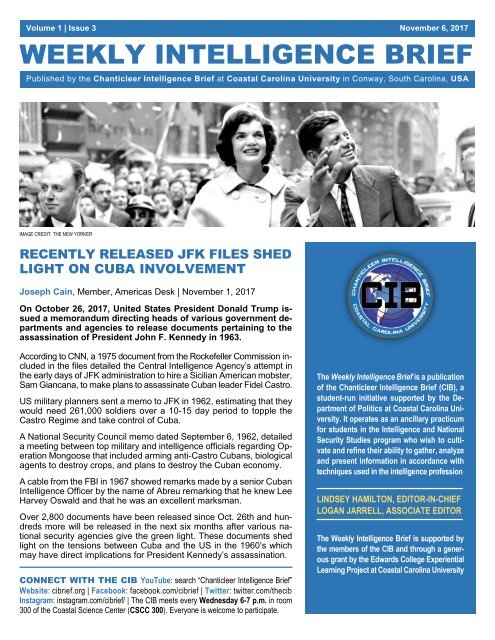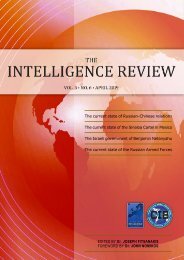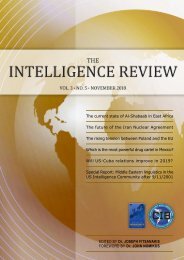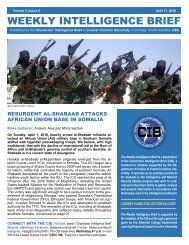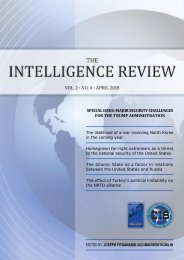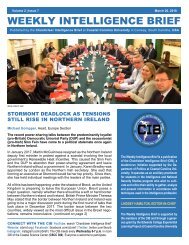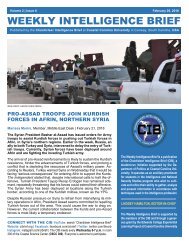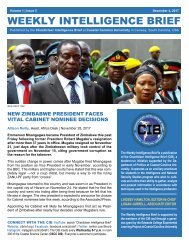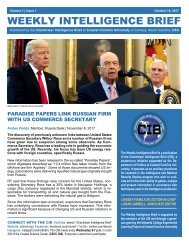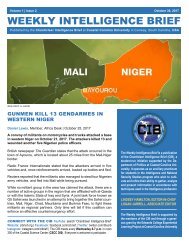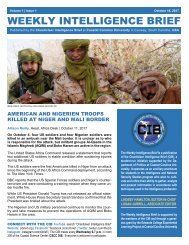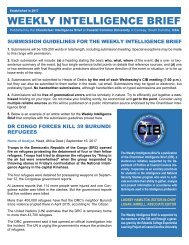CIB Weekly Intelligence Brief | Vol. 01 | Iss. 03
CIB Weekly Intelligence Brief | Vol. 01 | Iss. 03 | 06 November 2017
CIB Weekly Intelligence Brief | Vol. 01 | Iss. 03 | 06 November 2017
Create successful ePaper yourself
Turn your PDF publications into a flip-book with our unique Google optimized e-Paper software.
<strong>Vol</strong>ume 1 | <strong>Iss</strong>ue 3 November 6, 2<strong>01</strong>7<br />
WEEKLY INTELLIGENCE BRIEF<br />
Published by the Chanticleer <strong>Intelligence</strong> <strong>Brief</strong> at Coastal Carolina University in Conway, South Carolina, USA<br />
IMAGE CREDIT: THE NEW YORKER<br />
RECENTLY RELEASED JFK FILES SHED<br />
LIGHT ON CUBA INVOLVEMENT<br />
Joseph Cain, Member, Americas Desk | November 1, 2<strong>01</strong>7<br />
On October 26, 2<strong>01</strong>7, United States President Donald Trump issued<br />
a memorandum directing heads of various government departments<br />
and agencies to release documents pertaining to the<br />
assassination of President John F. Kennedy in 1963.<br />
According to CNN, a 1975 document from the Rockefeller Commission included<br />
in the files detailed the Central <strong>Intelligence</strong> Agency’s attempt in<br />
the early days of JFK administration to hire a Sicilian American mobster,<br />
Sam Giancana, to make plans to assassinate Cuban leader Fidel Castro.<br />
US military planners sent a memo to JFK in 1962, estimating that they<br />
would need 261,000 soldiers over a 10-15 day period to topple the<br />
Castro Regime and take control of Cuba.<br />
A National Security Council memo dated September 6, 1962, detailed<br />
a meeting between top military and intelligence officials regarding Operation<br />
Mongoose that included arming anti-Castro Cubans, biological<br />
agents to destroy crops, and plans to destroy the Cuban economy.<br />
A cable from the FBI in 1967 showed remarks made by a senior Cuban<br />
<strong>Intelligence</strong> Officer by the name of Abreu remarking that he knew Lee<br />
Harvey Oswald and that he was an excellent marksman.<br />
Over 2,800 documents have been released since Oct. 26th and hundreds<br />
more will be released in the next six months after various national<br />
security agencies give the green light. These documents shed<br />
light on the tensions between Cuba and the US in the 1960’s which<br />
may have direct implications for President Kennedy’s assassination.<br />
CONNECT WITH THE <strong>CIB</strong> YouTube: search “Chanticleer <strong>Intelligence</strong> <strong>Brief</strong>”<br />
Website: cibrief.org | Facebook: facebook.com/cibrief | Twitter: twitter.com/thecib<br />
Instagram: instagram.com/cibrief/ | The <strong>CIB</strong> meets every Wednesday 6-7 p.m. in room<br />
300 of the Coastal Science Center (CSCC 300). Everyone is welcome to participate.<br />
The <strong>Weekly</strong> <strong>Intelligence</strong> <strong>Brief</strong> is a publication<br />
of the Chanticleer <strong>Intelligence</strong> <strong>Brief</strong> (<strong>CIB</strong>), a<br />
student-run initiative supported by the Department<br />
of Politics at Coastal Carolina University.<br />
It operates as an ancillary practicum<br />
for students in the <strong>Intelligence</strong> and National<br />
Security Studies program who wish to cultivate<br />
and refine their ability to gather, analyze<br />
and present information in accordance with<br />
techniques used in the intelligence profession<br />
LINDSEY HAMILTON, EDITOR-IN-CHIEF<br />
LOGAN JARRELL, ASSOCIATE EDITOR<br />
The <strong>Weekly</strong> <strong>Intelligence</strong> <strong>Brief</strong> is supported by<br />
the members of the <strong>CIB</strong> and through a generous<br />
grant by the Edwards College Experiential<br />
Learning Project at Coastal Carolina University
UNITED STATES PLEDGES $60 MILLION<br />
TO AFRICAN COUNTERTERRORISM<br />
FORCE<br />
Daniel Lewis, Member, Africa Desk | October 31, 2<strong>01</strong>7<br />
On October 30, 2<strong>01</strong>7, United States Secretary of State Rex Tillerson<br />
announced that $60 million in bilateral assistance will be allocated<br />
by the US to build up the regional coalition between Mali,<br />
Niger, Chad, Burkina Faso, and Mauritania, a group of nations<br />
known collectively as the G5 Sahel.<br />
Russian news agency Sputnik relayed that Rex Tillerson stated that<br />
the money would be used to help the African countries to combat local<br />
militant groups and ensure security in the region.<br />
Kenyan President Uhuru Kenyata<br />
IMAGE CREDIT: EBRU TV, KENYA<br />
WHAT THE ELECTION<br />
MEANS FOR KENYA<br />
Chris Bruttomesso, Member, Africa Desk<br />
October 31, 2<strong>01</strong>7<br />
After the second national election in<br />
three months, Kenyan voters have decided<br />
to reelect former president Uhuru<br />
Kenyatta for another five-year term. Kenyatta<br />
won by a reported 98 percent of the<br />
vote, after his opponent, Raila Odinga,<br />
dropped out of the race before the revote<br />
began.<br />
In August, results from Kenya’s first election<br />
were thrown out due to a voting fraud<br />
scandal.<br />
CNN reports that Kenya’s second election<br />
had a 38% turnout rate of a total of 19.6<br />
million registered voters.<br />
NPR reports that after the election, riots<br />
broke out in the slums around Nairobi, currently<br />
leaving at least 24 people dead.<br />
As of October 31, 2<strong>01</strong>7, riots are still happening<br />
all across the slums in Nairobi.<br />
It is likely that terrorist groups like al-Shabaab,<br />
which are active in Kenya, will try to<br />
use President Kenyatta’s controversial reelection,<br />
low popularity and low voter turnout<br />
to recruit members. Such a development<br />
could make Kenya more susceptible<br />
to militancy from various terrorist groups.<br />
The United Nations informs that the Multidimensional Integrated Stabilization<br />
Mission in Mali (MINUSMA) was created in 2<strong>01</strong>3 to support<br />
the Malian political process and carry out security-related tasks in the<br />
region.<br />
The United States Mission to the United Nations released comments<br />
by the US ambassador to the UN, Nikki Haley, who raised concerns<br />
about the unsuccessful efforts by MINUSMA and use of UN resources<br />
to support non-UN activities.<br />
Agence France Presse states that Nikki Haley stressed the importance<br />
of regional countries taking full ownership of the new G5 force to ensure<br />
future success and stability.<br />
MINUSMA is currently being branded as the most dangerous peacekeeping<br />
mission by the United Nations. It is also being criticized for its<br />
alleged ineffectiveness. It is therefore likely to receive more attention from<br />
the US. While stabilization in the region is a long process, some see<br />
MINUSMA’s increasing visibility as a step in the right direction.<br />
SIGN UP FOR SPRING 2<strong>01</strong>8 <strong>CIB</strong> CLASSES<br />
The Chanticleer <strong>Intelligence</strong> <strong>Brief</strong> is the premier student group of<br />
the <strong>Intelligence</strong> and National Security Studies program at Coastal<br />
Carolina University. It seeks to prepare students for careers in<br />
the United States <strong>Intelligence</strong> Community. <strong>CIB</strong> Members in good<br />
standing, meaning that they have attended a minimum of 75 percent<br />
of the club’s Wednesday evening meetings in a single semester, become<br />
eligible to take the <strong>CIB</strong> class, which is offered every semester.<br />
The one-credit class allows <strong>CIB</strong> members to progress to the level of a<br />
<strong>CIB</strong> analyst, and specialize on a topic of their choice for an entire semester.<br />
As part of the class, they are able to compete for awards and<br />
submit their work for publication in The <strong>Intelligence</strong> Review, the <strong>CIB</strong>’s<br />
peer-reviewed journal, which is published twice a year. You can still<br />
sign up for next semester’s <strong>CIB</strong> classes. Look for these Tuesday classes<br />
on Webadvisor:<br />
POLI*396*<strong>03</strong> Intel Analysis Practicum Tuesday 12:45 – 2:00 p.m.<br />
POLI*396*04 Intel Analysis Practicum Tuesday 2:10 – 3:25 p.m.<br />
POLI*396*05 Explorations in Poli Sci Tuesday 3:35 – 4:50 p.m.


